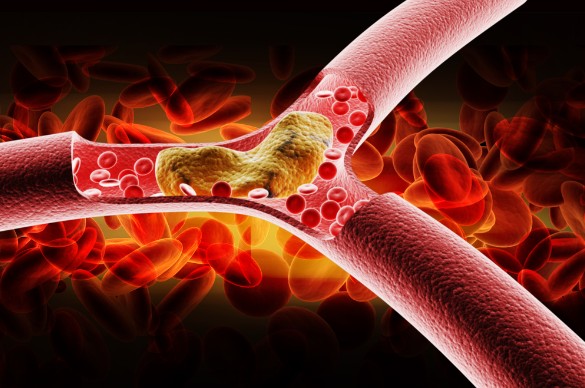The Diet That Melts Away Fat
While we already know that a proper diet, like a low-fat diet, could be effective in preventing diseases, Israeli researchers now claim: persistence in healthy eating patterns positively impacts the regression of diseases such as atherosclerosis over time.

Maintaining healthy eating habits (like a low-fat or low-cholesterol diet, for example) not only prevents diseases but also fights them and eradicates them after they develop. This is according to an Israeli study first published in late 2009.
According to the study, first published in Circulation – the leading American scientific journal in cardiology by the American Heart Association, the diet is good not only for the figure but also for vascular health, and it is capable of dissolving atherosclerotic plaques.
What is Atherosclerosis?
Hadas Baskind-Halimi, a clinical dietitian at Clalit Group: "Atherosclerosis (or arteriosclerosis, Atherosclerosis) is a disease that affects arteries. The practical manifestation of the disease is the gradual deposition of fats in the inner wall of the artery, which causes a gradual blockage of blood flow."
How Does Atherosclerosis Affect Different Parts of the Body?
"When the artery is completely blocked, the blood supply to the area it supplies is impaired, and the cells die from a lack of oxygen. This is a widespread process that can occur in any artery in the body. For example, partial blockage in the heart arteries causes chest pain during exertion, and when the blockage is complete, a heart attack occurs. When the blockage is in the brain arteries, a stroke occurs."
When Does Atherosclerosis Strike?
"Atherosclerosis actually begins at a young age, but it usually manifests around the age of 50. One cannot escape this atherosclerotic process, but the rate of its occurrence varies from person to person and accelerates in individuals with risk factors for atherosclerotic disease."
Three Types of Diets
What Did Israeli Researchers Find?
"Findings from a new Israeli study, for the first time, show that diet has a direct effect on the regression of accumulated atherosclerosis in the artery leading to the brain, whose blockage is a primary risk factor for stroke. The study was conducted over two years, from 2005 to 2007, by researchers from Ben Gurion University led by Dr. Iris Shai, researchers from the Nuclear Research Center in Dimona, and Soroka University Medical Center, part of Clalit Group. Experts from Harvard University in the United States, Western Ontario University in Canada, and Leipzig University in Germany also participated in the study.
"Researchers compared three types of diets: low-carb diet; Mediterranean diet; low-fat diet.
"The study continues previous research first published in July 2008 in the New England Journal of Medicine. According to the previous research, low-carb (Atkins) diet and Mediterranean diet are effective alternatives to a low-fat diet for weight loss. It was also found that the low-carb diet has a better effect on blood fat levels, while the Mediterranean diet is very good for glycemic balance.

"The current study involved 140 individuals, most of whom were men (88 percent), with an average age of 51 years. The degree of obesity of the participants was defined as moderate: BMI = 30. Participants were randomly assigned to one of the three diet groups.
"Low-fat diet: Based on the guidelines of the American Heart Association – 30 percent of the calories are from fat, and ten percent are from saturated fat. Cholesterol intake was limited to up to 300 milligrams a day. Participants were instructed to eat grains, vegetables, fruits, and legumes, and to limit their intake of fats, sweets, and high-fat snacks.
"Mediterranean diet: Up to 35 percent of the calories are from fat, mostly from olive oil or nuts. This diet is rich in vegetables and low in beef, with protein mainly provided by chicken and fish.
"Low-carb diet: Based on Atkins Diet. Participants in this diet were asked to consume 20 grams of carbohydrates per day during the first two months of the trial. Over time, carbohydrates were gradually added to the menu – up to 120 grams per day. In this diet, participants were not restricted in calories, fat, and protein but were instructed to choose fat from plant sources and avoid trans fats.
"In the baseline data of the participants, it was found that people with thicker blood vessel walls were significantly at higher levels of weight, age, blood pressure, and insulin in the blood. Men had a higher baseline wall volume than women."
The Impact
How did the different diets affect atherosclerosis?
"After two years of research, it was found that participants in the study who managed to lose weight on any of the three diets showed a regression in atherosclerosis in the blood vessels leading to the brain. The effect was noticeable among individuals with moderate tendencies toward obesity who, over two years, lost at least 5.5 kilograms in weight and subsequently reduced their systolic blood pressure by at least 7 mm Hg.
"The results of the study showed that through diet alone, the volume of the carotid artery wall significantly regressed by 60 mm³ (five percent). This significant result was observed in both low-fat, Mediterranean, and low-carb diets. These results have far-reaching significance given the fact that naturally, with age, there is a progressive thickening of the artery wall and the atherosclerotic plaque."
What would have happened to those people if they did not diet?
"When comparing participants who showed success in atherosclerosis regression to those who showed continuous thickening, as expected over two years, it was found that the successful ones were significantly characterized by greater reduction in weight, blood pressure, as well as a reduction in blood protein called homocysteine and a higher increase in protein related to good cholesterol HDL."
The head researcher, Dr. Iris Shai, notes that "Findings from this study indicate that persistence in healthy eating patterns affects the regression of atherosclerosis over time, even if there is a partial increase in weight over time."

